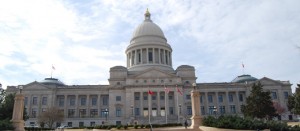 By Steve Brawner
By Steve Brawner
© 2017 by Steve Brawner Communications, Inc.
This may be true: Arkansans believe the state’s highways need work, and many are willing to pay to improve them, but not at the pump. And this definitely is true: They want to make that choice, not have it made for them.
That’s based on a recent poll of 800 Arkansans by the Arkansas Good Roads Foundation. Ninety percent said the state’s highways “are in need of repair,” but 62 percent said they opposed increasing fuel taxes, which are the primary source of road funding. Support increased when told those taxes haven’t been raised in 15 years, but even then only 48 percent supported increasing them just 1-3 cents per gallon. The numbers dropped dramatically for higher amounts so that only 5 percent supported an increase of 5-8 cents. We can’t fix the roads on 1-3 cents.
There’s just something about paying higher fuel taxes that a lot of people can’t abide. Fuel is seen as a necessity and the taxes are visible, which ought to be a selling point, but I guess we like to pretend we’re not paying them.
Fuel taxes actually are among the easiest and fairest ways to raise money for highways. Collection costs are low, and the taxes are paid by road users. The person receiving the government service actually pays for the service, so if you don’t want to pay higher taxes, you can drive less or drive more efficiently. The other plus is that some of the taxes are paid by travelers and truckers passing through our smack-dab-in-the-middle-of-the-country state, rather than by Arkansans.
Fuel taxes have their own problems however, in that they are destined to be a declining revenue source each time cars become more fuel efficient, which is often. (Because of that, and because of inflation, drivers basically receive a fuel tax cut every year.) Moreover, they aren’t completely fair, either. The laborer who gets to work in a duct-taped 1987 Oldsmobile that gets 12 miles per gallon pays more than someone who can afford a newer, more fuel-efficient vehicle. If you can pay the $33,220 starting price to buy a Chevy Volt electric car, then you can enjoy the government-funded highways almost for free.
But while poll respondents don’t want to pay higher fuel taxes, a surprising majority, 62 percent, were willing to continue an existing tax that was set to expire in a few years. That would be the 10-year half-cent sales tax passed by voters in 2012 that is funding the Connecting Arkansas Program. That tax specifically exempts fuel and food, meaning it’s not a user fee at all. The grandmother on a fixed income who never drives far is paying for highways every time she shops at the corner store. When asked the same question about extending the half-cent sales tax a second time at the end of the survey, support rose to 69 percent, suggesting some might be open to having their minds changed.
I guess it’s easier to keep paying the tax you’re already paying, and not let it expire, then it is to pay a new one.
Keep in mind that this was a poll, and polls, you may recall from recent history, don’t always get things exactly right. The order of the questions matters, too. If you tell a pollster that the roads are bad, you’re probably primed to later say you’d pay more to fix them. But based on the survey, Arkansans certainly might be willing to increase taxes for highways.
But they want to be in charge of making that choice. Eighty-one percent would be more likely to support a legislator who referred a highway tax increase to them for a vote, while 12 percent would be less likely. Meanwhile, 45 percent would be less likely to support a legislator who voted for a straight up tax increase, while only 38 percent would be more supportive.
That’s not news to legislators, who aren’t exactly lining up to introduce bills to raise taxes for highways. They knew how their constituents felt about it long before this survey.
The poll’s results might persuade some of them to refer the matter to voters, but that doesn’t mean it will happen. Yes, 81 percent might tell a pollster they would be more supportive of a legislator who referred a tax increase to them. But legislators know the 12 percent who say they wouldn’t be – they really mean it.